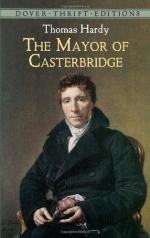Farfrae was shown out, it having entirely escaped him that he had called to see Elizabeth. Lucetta at the window watched him threading the maze of farmers and farmers’ men. She could see by his gait that he was conscious of her eyes, and her heart went out to him for his modesty—pleaded with her sense of his unfitness that he might be allowed to come again. He entered the market-house, and she could see him no more.
Three minutes later, when she had left the window, knocks, not of multitude but of strength, sounded through the house, and the waiting-maid tripped up.
“The Mayor,” she said.
Lucetta had reclined herself, and she was looking dreamily through her fingers. She did not answer at once, and the maid repeated the information with the addition, “And he’s afraid he hasn’t much time to spare, he says.”
“Oh! Then tell him that as I have a headache I won’t detain him to-day.”
The message was taken down, and she heard the door close.
Lucetta had come to Casterbridge to quicken Henchard’s feelings with regard to her. She had quickened them, and now she was indifferent to the achievement.
Her morning view of Elizabeth-Jane as a disturbing element changed, and she no longer felt strongly the necessity of getting rid of the girl for her stepfather’s sake. When the young woman came in, sweetly unconscious of the turn in the tide, Lucetta went up to her, and said quite sincerely—
“I’m so glad you’ve come. You’ll live with me a long time, won’t you?”
Elizabeth as a watch-dog to keep her father off—what a new idea. Yet it was not unpleasing. Henchard had neglected her all these days, after compromising her indescribably in the past. The least he could have done when he found himself free, and herself affluent, would have been to respond heartily and promptly to her invitation.
Her emotions rose, fell, undulated, filled her with wild surmise at their suddenness; and so passed Lucetta’s experiences of that day.
24.
Poor Elizabeth-Jane, little thinking what her malignant star had done to blast the budding attentions she had won from Donald Farfrae, was glad to hear Lucetta’s words about remaining.
For in addition to Lucetta’s house being a home, that raking view of the market-place which it afforded had as much attraction for her as for Lucetta. The carrefour was like the regulation Open Place in spectacular dramas, where the incidents that occur always happen to bear on the lives of the adjoining residents. Farmers, merchants, dairymen, quacks, hawkers, appeared there from week to week, and disappeared as the afternoon wasted away. It was the node of all orbits.
From Saturday to Saturday was as from day to day with the two young women now. In an emotional sense they did not live at all during the intervals. Wherever they might go wandering on other days, on market-day they were sure to be at home. Both stole sly glances out of the window at Farfrae’s shoulders and poll. His face they seldom saw, for, either through shyness, or not to disturb his mercantile mood, he avoided looking towards their quarters.




